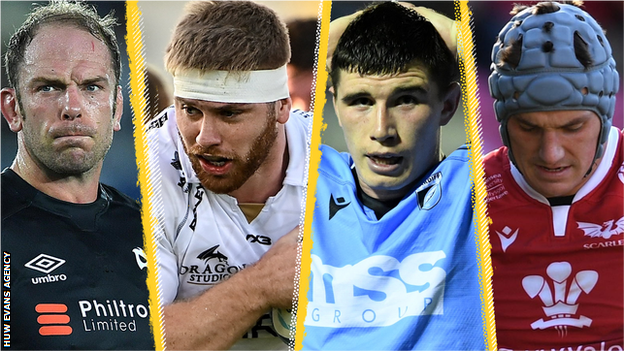Four Welsh regions 'important' but no Professional Rugby Board pledge on future
- Published

Alun Wyn Jones of Ospreys, Dragons' Aaron Wainwright, Cardiff's Seb Davies and Jonathan Davies of Scarlets all play for Wales
Welsh rugby's Professional Rugby Board (PRB) says it is committed to ensuring the four regions "continue to play important roles in the professional game".
The PRB is made up of representatives of the regions and Welsh Rugby Union.
The PRB stopped short of guaranteeing Ospreys, Scarlets, Cardiff and Dragons would continue in their current form.
A recent proposal was made to reduce the number of Welsh regions from four to three.
That recommendation was suggested in the Oakwell report commissioned for the PRB.
The independent report looked at the Welsh game's financial future and the PRB, which runs the professional game in Wales, met on 11 May to discuss it.
The PRB statement does not directly address any of the specific issues raised by the report and falls short of stating it is committed to keeping the regions in their current existence.
The statement read: "The Professional Rugby Board met on Wednesday, 11 May, to continue discussions to further develop its strategy for a sustainable and ultimately successful professional game in Wales.
"The PRB is committed to working together to ensure all four regions continue to play important roles in the professional game.
"We will meet further over the coming weeks to ensure the strategy protects and grows our game and remain committed to communicating further progress to all as soon as appropriate."
The PRB board comprises of Alun Jones (Cardiff), David Buttress (Dragons), Nick Garcia (Ospreys) and Simon Muderack (Scarlets), Welsh Rugby Union (WRU) chief executive Steve Phillips, WRU finance director Tim Moss and independent members, PRB chair Malcolm Wall and Marianne Økland.
Former WRU chief executive David Moffett agrees with 'three-team' proposal
Difficult times
Cardiff director of rugby Dai Young was in charge of his side when regions came into existence in 2003 and witnessed the demise of the Celtic Warriors a year later.
In a season where no regional team managed a victory in European competition and where all four failed to finish in the top half of the United Rugby Championship, Young accepts some change is required.
"It is a difficult time for anybody in any walk of life when their livelihood becomes threatened, whether you are a rugby player or a policeman or anything," said Young.
"Part and parcel of professional sport is that uncertainty.
"You can only live from contract to contract half the time, so you do get a little bit used to the uncertainty of a professional career. Even if it doesn't affect you, it is always going to affect you. At the minute, we don't seem to be a part of the discussion, but we all feel for each other.
"The difficulty is everyone has said something needs to change. We have all said that.
"We all feel there is need for change. What that looks like, who knows? That's certainly not my decision. That's for other people to look at really.
"We all fight change if it means an adverse effect personally, individually or collectively around yourself.
"It's always going to be tough, but the reality is we can't get away from [the fact that] something has to change. What that looks like is over to other people
"I am not advocating cutting regions or whatever.
"That's not my decision, but we all want to be more competitive and we all want to be thriving. How we get there, I'm not quite sure."

BORN DEAF, RAISED HEARING: Jonny Cotsen explores what it means to live in two different worlds
MARGINS TO MAINSTREAM: Michael Sheen introduces new writers revealing their truths
